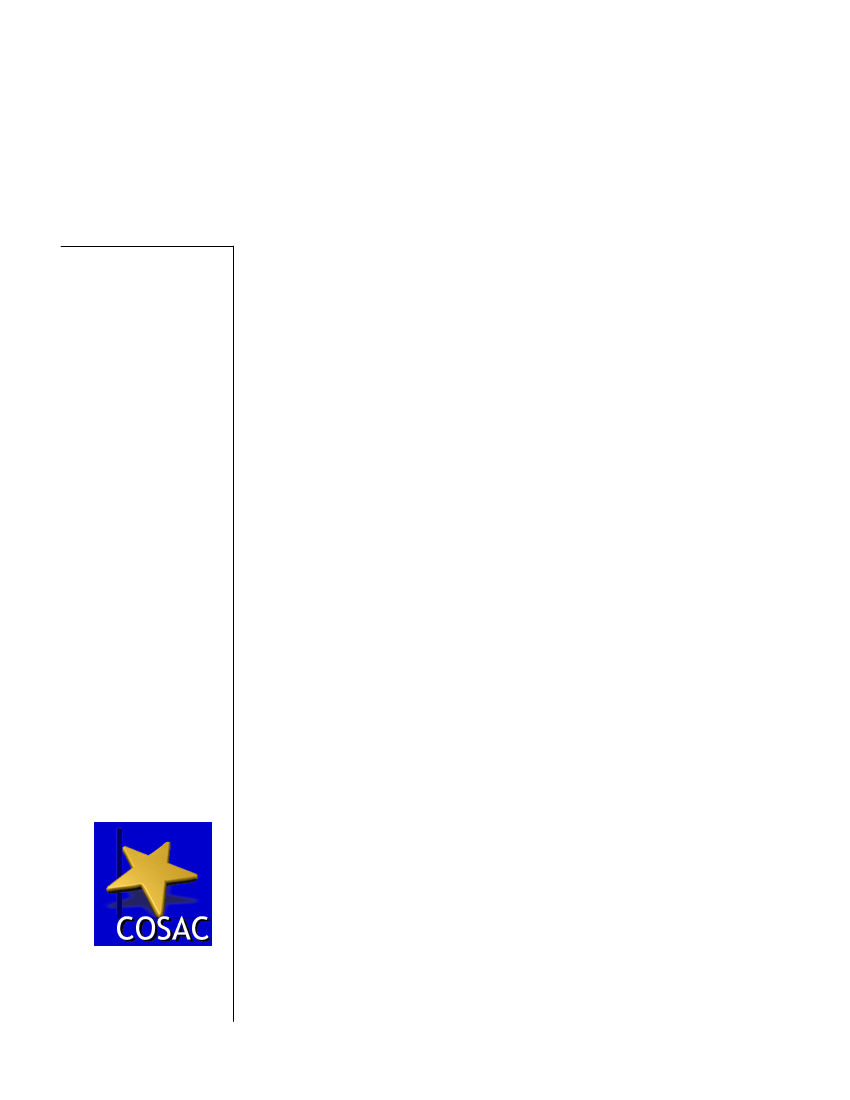Europaudvalget 2009-10
EUU Alm.del Bilag 21
Offentligt
October 2009
Twelfth Bi-annual Report:Developments in European UnionProcedures and PracticesRelevant to Parliamentary Scrutiny
Prepared by the COSAC Secretariat and presented to:XLII Conference of Community and European AffairsCommittees of Parliaments of the European Union5-6 October 2009Stockholm
Conference of Community and European Affairs Committees of Parliamentsof the European Union
COSAC SECRETARIATRMD 02 J 032, 89 rue Belliard, B-1047 Brussels, BelgiumE-mail:[email protected]| Fax: +32 2 230 0234
2
Table of ContentsBackground ............................................................................................................................. 4Abstract................................................................................................................................... 5Chapter 1: Transparency of the Parliamentary Scrutiny Process............................................... 71.1Publication by Parliaments of Documents on EU Matters......................................... 71.2Government Documents Necessary for Transparent and Effective ParliamentaryScrutiny of EU Matters........................................................................................................ 91.3Public Accessibility to Parliamentary Documents on EU Matters........................... 101.4Informing the Public about the State of Play of Ongoing EU Negotiations ............. 101.5Openness and Transparency of the Parliamentary EU Scrutiny Process.................. 111.6Parliamentary EU Information Offices/Units.......................................................... 121.7Plans to Increase Transparency when Dealing with EU Matters ............................. 13Chapter 2: Parliamentary Scrutiny of the Stockholm Programme........................................... 142.1 Introduction ................................................................................................................. 142.2 Scrutiny by the Committees on EU Affairs .................................................................. 152.3 Involvement of Specialised Committees ...................................................................... 152.4 Involvement of Other Bodies ....................................................................................... 162.5 Specific Measures to Ensure Coordination during Scrutiny.......................................... 172.6 Experience Gained when Scrutinising the Tampere and/or Hague Programmes ........... 172.7 Interparliamentary Cooperation in Scrutinising the Stockholm Programme.................. 18
3
BackgroundThis is the Twelfth Bi-annual Report from the COSAC Secretariat.
COSAC Bi-annual ReportsThe XXX COSAC decided that the COSAC Secretariat should producefactual Bi-annual Reports, to be published ahead of each plenaryconference. The purpose of the reports is to give an overview of thedevelopments in procedures and practices in the European Union that arerelevant to parliamentary scrutiny.All the Bi-annual Reports are available on the COSAC website at:http://www.cosac.eu/en/documents/biannual/
The two chapters of this Bi-annual Report are based on information provided by nationalparliaments and the European Parliament.Each chapter begins with the relevant part of the outline adopted by the Meeting of theCOSAC Chairpersons, held on 6 July 2009 in Stockholm.As a general rule, the Report does not specify all parliaments or chambers whose case isrelevant for each point. Rather illustrative examples, introduced in the text as "e.g.", are used.The COSAC Secretariat is grateful to the contributing parliaments for their cooperation.
Note on NumbersOf the 27 Member States of the European Union, 14 have a unicameralparliament and 13 have a bicameral parliament. Due to this mixture ofunicameral and bicameral systems, there are 40 national parliamentarychambers in the 27 Member States of the European Union.Although they have bicameral systems, the national parliaments of Austria,Ireland, Italy, Romania and Spain each sent a single set of replies to thequestionnaire drafted by the COSAC Secretariat.The COSAC Secretariat received replies from 40 national parliaments orchambers of 27 Member States and the European Parliament. These replies arepublished in a separate annex to this Bi-annual Report which is also available onthe COSAC website at:http://www.cosac.eu/en/documents/biannual/
4
Abstract
CHAPTER 1: Transparency of the Parliamentary Scrutiny ProcessAnalysis of the replies of the parliaments/chambers has revealeddifferent degrees oftransparencyof parliamentary EU scrutiny processes anddivergent parliamentary practicesin making information on EU matters accessible to the public.A number of parliaments/chambers take active measures in makingpublic the documents ofthe EU institutions,primarily received from the European Commission. On the other hand,more than half of parliaments/chambersdo not publish those documentsbecause they areproduced by a third party or because they are already in the public domain.As to thedocuments received from governments,the overwhelming majority ofparliaments/chambers do not publish them, since they are either available to the public on thegovernment’s website or are considered non-public.The vast majority of parliaments/chambers aresatisfied with the documentsreceived fromtheir governments, which enable them to conduct transparent and effective parliamentaryscrutiny of EU matters. However, several parliaments/chambers expressedconcernsaboutlatedepositof EU documents,lack of informationabout the government’s evolving position,about first reading agreements, failure to deposit drafts of Council and European CouncilConclusions and other EU documents marked as limited.The overwhelming majority ofplenary debates,including those on EU affairs, are open to thepublic. In addition, they are often broadcast on national and/or parliamentary television, on theradio and are web streamed.In more than half of the parliaments/chambers, meetings of the Committees on EU Affairs areusually open to the public. In addition, selected meetings are web streamed and broadcast onnational or parliamentary television.Several parliaments/chambers have established their ownEU Information Officesaimed atproviding accessible information on EU matters to the general public, as well as to members ofparliament and parliamentary staff. In most parliaments/chambers, however, no specific unitsproviding information about the EU to the public have been created.A number of parliaments/chambers have identified thewebsitesand the information providedon them as a major channel for making the handling of EU matters more transparent to thegeneral public. The need tohold more debates on EU mattersis also an issue of concernamong national parliaments. Several parliaments/chambers have also mentioned an ongoinginternal debate on the need tomodify their procedures or administrative structuresin orderto be able to handle EU information more transparently and to increasepublicity of theirplenary sittings and meetings of the Committees on EU Affairs.
5
CHAPTER 2: Parliamentary Scrutiny of the Stockholm ProgrammeAlmost all parliaments/chambersforesee that theywill scrutinise the StockholmProgramme before it is adoptedby the Council in December 2009 and before any proposalsfor legislative acts based on the Programme are presented.In most cases, it is theCommittee on EU Affairsthathas the main responsibility forscrutinisingthe Stockholm Programme, at least until proposals for legal acts are presented. Inmany cases it is the Commission's Communication that is the object of scrutiny, while in othercases it is the respective government's position on the Communication. There are also mixedforms of scrutiny.In a majority of parliaments/chambers,one or more specialised committees will be involvedin scrutinising the Stockholm Programme. As a general rule, their role is to participate indebates and/or to submit (written) opinions to the Committee on EU Affairs. In a few cases,however, a specialised committee is the main committee responsible.In many parliaments/chambers a plenary debateon the Stockholm Programme is plannedor likely to be held, given the importance of this EU policy document.Procedures foreseen for the scrutinyof the Stockholm Programme are in most cases similarto those used for the scrutiny of all EU legislative proposals. In some parliaments/chambersthey are based on the same principles applied for the scrutiny of the Tampere and HagueProgrammes.An overwhelming majority of parliaments/chambers are of the opinion thatinterparliamentary meetingsas a means of direct exchange of experience among members isa useful toolin improving scrutiny in general and in the area of Justice and Home Affairs inparticular. If such a meeting takes place before a decision in the Council is finalised, then itmay bring added value for the efficiency of parliamentary scrutiny.
6
Chapter 1: Transparency of the Parliamentary Scrutiny ProcessAn open and transparent process is of paramount importance in order to allow citizens tofollow the work of the European Union and to enhance their sense of participation.Transparency is therefore an ever-topical issue. Certain aspects of it have previously been dealtwith by COSAC in the second Bi-annual Report (Transparency and traceability - Nov. 2004)and the fourth Bi-annual Report (Transparency in the Council - Oct. 2005).The discussion on transparency often focuses on access to documents, however the interests of,and development towards, a more transparent European Union reach beyond this. One exampleis the increasing openness of deliberations on legislative matters in the Council. Of particularimportance for citizens is access to information and opportunities to follow procedures duringthe parliamentary scrutiny processes of particular European issues.The purpose of this chapter is to examine the transparency of the process in parliaments whenconducting scrutiny at different stages of the decision-making process in the Union. The issuecovers the accessibility of documents that parliaments receive from the EU institutions andgovernments in the course of negotiations. It also includes the openness of national parliamentsand the European Parliament as regards information on the actual negotiations in the EuropeanUnion, as well as on their own scrutiny procedures and positions. The chapter presents whatinformation parliaments make available to the public as well as when and in which ways.1.1Publication by Parliaments of Documents on EU Matters
Analysis of the replies of the parliaments/chambers has revealeddifferent degrees oftransparencyof parliamentary EU scrutiny processes anddivergent parliamentary practicesin making information on EU matters accessible to the public.As to thedocuments of the EU institutions,primarily of the European Commission(henceforth “the Commission”) received under "the Barroso initiative", a number ofparliaments/chambers take active measures in making these documents accessible to thepublic. The BulgarianNarodno Sabranie,the DanishFolketing,the FrenchAssembléenationaleand the LithuanianSeimas, for example,publish these documents on theirwebsites.Some parliaments/chambers only publish the documents of the EU institutions which theparliaments have decided toscrutinise.For instance, the FrenchSénatand the CzechSenátonly publish the documents relating to theinitial stageof the EU legislative process which aresubject to parliamentary scrutiny.A group of parliaments/chambers publish documents of the EU institutions onlyunder certaincircumstances.For instance, the SlovenianDržavni svetmakes EU documents accessible tothe public when thematter is put on the agendaof the parliamentary sessions or of itsworking bodies. The FinishEduskuntamakes documents and the position of the governmentaccessible to the publicafter the Grand Committee meetingstogether with the minutes ofthe meetings. The GermanBundestagpublishes some EU documents after they have beendeliberated by the plenary.The MalteseKamra tad-Deputati,on the other hand, publishes
7
the entire file, including the government explanatory memorandum and relevant documents ofthe EU institutions once parliamentaryscrutiny of the dossier is complete.All documentssent to the UKHouse of Commonsby the EU institutions are availableon requestfrom theEuropean Scrutiny Committee or the Library of the House.On the other hand, more than half of parliaments/chambersdo not publish the documents ofthe EU institutions.They base this decision on the fact that the documents are produced by athird party or because they are already in the public domain,i.e.accessible to the generalpublic on the websites of the EU institutions, online databases and IPEX.In the CzechPoslanecká sněmovna,the documents originating from the Commission arepresented to the members of the Committee for European Affairs in the form of weeklyannotated overviews prepared by the Parliamentary Institute1and published on the website ofthe Institute. The CypriotVouli ton Antiprosopon,on the other hand, makes such documentsavailable to interested parties and NGOs whenever they are asked to express their views on aspecific matter examined by the Parliamentary Committee on European Affairs. TheHungarianOrszággyűlésensures direct access to EU documents being scrutinised or put on theagenda of the Committee on European Affairs by putting a link to EU databases on theCommittee’s website. Instead of publishing EU documents, the European Union Directorate ofthe BulgarianNarodno Sabraniepublishes a weekly bulletin "Euronews" (in printed andelectronic versions) which features a heading "News from European Institutions".As to thedocuments received from governments,the overwhelming majority ofparliaments/chambersdo not publishthem. In some cases, however, they are available to thepublic on the government’s website and copies are available on request from the Committeeson EU Affairs (e.g. the UKHouse of Commons).In the Netherlands, the documents that theTweede Kamerreceives from the government, EU legislative proposals that are subjected tothe parliamentary subsidiarity check and those that need the approval of parliament beforegovernmental approval in the JHA Council, are published by the State Printing Office.On the other hand, in the DanishFolketing,all documentsfrom the EU institutions, thegovernment, NGOs, private personsetc.sent to the European Affairs Committee and/orspecialised committeesare made automatically publicon the parliament’s website if they arenot marked as confidential or limited. All public documents are also published on the websiteof the EU Information Office of theFolketing.The SwedishRiksdagfollows a similar practiceas far as government documents are concerned.TheEuropean Parliament has its own public register of documentsand has been issuingannual reports on access to documents through it since 2001.2In 2007, a new feature wasadded to the European Parliament website, giving the public direct access to parliamentarycommittee documents by procedure, committee or document type. Moreover, theEuropeanParliament Legislative Observatory(Oeil) provides access to summaries at every proceduralstage in which the European Parliament is involved and links to the documents drawn up bythe EU institutions.
12
Information and research service for the members of parliament.Regulation 1049/2001 contain limitations on public access to documents whose disclosure could significantlyundermine public security, monetary stability, defence and military matters or EU foreign policy interests,individual privacy and certain aspects of commercial secrecy that have to be balanced against private or publicinterest.
8
The LithuanianSeimashas full access to the LINESIS3database shared with the government.The database is accessible not only to the members of parliament and its civil servants dealingwith EU matters, but also to pre-registered social–economic partners, NGOs and members ofthe European Parliament elected in Lithuania. The latter three categories have access to the so-called‘mirror’ version of the LINESIS,where they can track,inter alia,EU documents,parts of national positions and timetables for inter-institutional coordination. The LatvianCommittee on European Affairs also has access to the government database ESDUS, whichincludes Council documents, internal reports,etc.Two parliaments areplanning to make their EU scrutiny procedures more openandtransparent. The PortugueseAssembleia da Repúblicais testing a database which shows theprogress of scrutiny of EU documents in parliament. This database will be accessible to thegeneral public and will contain all EU documents received by theAssembleia da República(except for confidential government positions). Also, the SlovakianNárodná radaplans tomake its internal database of EU documents and related domestic documents available to thepublic, except for national positions on EU draft legislation.Most of the parliaments/chambers make EU information available to the public only if it isavailable in the official language(s) of the Member State. However, the DutchEerste Kamerand the SwedishRiksdagmake documents accessible in Dutch and in Swedish respectively,and, if not available, then in English.1.2Government Documents Necessary for Transparent and Effective ParliamentaryScrutiny of EU Matters
The vast majority of parliaments/chambers aresatisfied with the documentsreceived fromtheir governments which enable them to conduct transparent and effective parliamentaryscrutiny of EU matters.Several parliaments have specified that their governments are under aconstitutionalobligationto provide parliaments with information on EU matters. Such provisions areenshrinede.g.in the Constitutions of Finland, France, Germany, the Netherlands andLithuania.However, several parliaments/chambers have expressedconcernsaboutlate depositof EUdocuments by governments (the SlovakianNárodná rada),lack of informationabout thegovernment’s evolving position (the CzechPoslanecká sněmovna),about first readingagreements at Coreper level (the DanishFolketing,the HungarianOrszággyűlés),failure todepositdocuments of the Council working groups and documents on infringement procedure(the Italian Parliament), failure to deposit drafts of Council and European Council Conclusions(the UKHouse of Commons)and other EU documents marked as limited (the UKHouse ofLords).In its July 2009 Report on Codecision and National Parliamentary Scrutiny4theEuropean Union Committee of the UKHouse of Lordsconcluded that "thereare occasionswhere Parliament is not provided with the right documents to enable it to scrutinise EUlegislative proposals effectively".The report also concluded that there is nothing in theCouncil’s rules of procedure to prevent these being provided to national parliaments. In this34
Information System for Lithuanian Membership of the EU.http://www.parliament.uk/parliamentary_committees/lords_eu_select_committee.cfm
9
context it is worth mentioning that, in the Netherlands, a special procedure has been devised toprovide the Dutch Parliament with those EU documents that are classified "restraint" or higher.From some replies it can also be inferred that the governments provide certain EU relatedinformation onlyupon parliament's/chamber's request(e.g. the CypriotVouli tonAntiprosopon,the PolishSenat,the Romanian Parliament) and that in some cases it is left tothe discretion of the government whether to provide the requested information (e.g. the FrenchParliament).1.3Public Accessibility to Parliamentary Documents on EU Matters
When it comes to the possibility for the public to access documents produced by theCommittees on EU Affairs, the majority of parliaments/chambers take active measures inmaking these documents public. In principle,almost all parliaments make their owndocuments,such as reports, minutes, resolutions, standpoints, opinionsetc.,available onparliamentary websites and in some cases publish them inpaper versions.Parliaments whichmake their documents accessible to the public in paper versions include,e.g.the BelgianSénat,the Czech Parliament, the GermanBundesratand the LithuanianSeimas.Others publish allpublic documents on their websites and selected documents in paper versions,e.g.the IrishHouses of the Oireachtas.Documents produced by the HungarianOrszággyülésin the courseof the scrutiny procedure are not accessible to the public, since both the government positionand the standpoint of the parliament are classified as non-public, although the opinions ofspecialised committees and verbatim of all public committee meetings are published.A few parliaments do not currently publish these documents, but are planning to do so in thenear future.1.4Informing the Public about the State of Play of Ongoing EU Negotiations
Most national parliaments have stated in their replies that they inform the public about ongoingEU negotiations, although in almost all parliaments/chambers theinformation is madeavailable indirectly,i.e.through documents, press releases, records of hearings, minutes,etc.Only a few parliaments/chambers have responded that they do not inform the public aboutongoing EU negotiations,e.g.the BelgianSénat,the MalteseKamra tad-Deputatiand theSpanishCortes Generales.In Spain, the government is empowered by the Constitution toconduct all international and European negotiations and theCortesdoes not take part in thesenegotiations. Also, the HungarianOrszággyüléshas mentioned that informing the public onEU negotiations is the responsibility of the government.In a number of parliaments/chambers, the public is informed about the state of negotiationsonrequest,e.g.the Austrian Parliament, the GreekVouli ton Ellinonand the LatvianSaeima.Forinstance, if the UKHouse of Commonsreceives a request from the public it provides as muchinformation as is available to the Committee, but also advises the enquirer to contact theGovernment Department.Several parliaments/chambers inform the public about the state of play of ongoing EUnegotiations byopening to the public ordinary parliamentary activities.For instance, theBulgarianNarodna Sabranieprovides EU information by holding public committee hearingswith the participation of government representatives; the CzechSenát- by holding publicplenary and committee debates; the FinishEduskunta- by publishing documents, including thepositions, which are the result of the Finish Government reporting to the Grand Committee; theItalian Parliament - through a public database of relevant documents, including records,verbatim and minutes and public government information.10
1.5
Openness and Transparency of the Parliamentary EU Scrutiny Process
The overview of the openness of the parliamentary scrutiny deliberations on EU matters hasrevealed diverse practices depending on whether the deliberations take place in the plenary orin parliamentary committees, Committees on EU Affairs being a separate category.The overwhelming majority ofplenary debates,including those on EU affairs, are open to thepublic. In addition, they are broadcast live on national television (e.g. the debates in theGerman Parliament, the HungarianOrszággyűlés,the DutchTweede Kamer),or retransmitted(e.g. CzechSenát,the LatvianSaeima).Worthy of noting is the fact that the Italian, French,Greek, Luxembourg, Portuguese, Romanian and Slovenian Parliaments broadcastparliamentary debates on theirown parliamentary television channels.By the end of 2009,the DanishFolketingwill also launch its own TV station where both meetings of theCommittee on European Affairs and the plenary will be broadcast.Plenary debates are alsobroadcast on radio.For instance, entire plenary sittings of theHungarianOrszággyűlésare broadcast live on the radio. Occasionally, plenary debates arebroadcast on the radio from the European Parliament, the LatvianSaeimaand the GermanBundesrat.Recently, the GreekVouli ton Ellinonlaunched itsown radio station(as a pilotproject) for broadcasting plenary and committee debates.Aiming at broadest possible transparency, debates in a number of parliaments/chambers areweb streamed(e.g. AustrianNationalrat,the Belgian, the Czech and the Polish Parliaments,the European Parliament, the FinnishEduskunta,the LithuanianSeimas,the SpanishCongresode los Diputadosand the UKHouse of Lords).All committee meetings,with rare exceptions, areopen to publicin a number ofparliaments/chambers,e.g.in the BelgianSénat,the Czech Parliament, the DutchTweedeKamer,the European Parliament, the Polish Parliament, the SlovakianNárodná radaand theSlovenianDržavni svet.Committee meetings are held behind closed doors only "if the specificnature of the matters being debated so justify" (the PortugueseAssembleia da República)In more than half of the parliaments/chambers,meetings of the Committees on EU Affairsare usually open to the public(e.g. the Austrian Parliament, the BelgianChambre desReprésentants,the DanishFolketing,the IrishHouses of the Oireachtas(including pre-GAERC briefings by the Minister of Foreign Affairs), the MalteseKamra tad-Deputati,thePolish Parliament and the Romanian Parliament). Exceptionally,in camerameetings are held,e.g.when the Committee or the government wishes to have a confidential discussion or whendeliberating classified documents or information. For instance, the Committees on EU Affairsof the UK Parliament hold public meetings when taking oral evidence, but not whendeliberating EU matters.In addition, a number of parliamentsweb streamat least some of themeetings of theirCommittees on EU Affairs(e.g. the DanishFolketing,the MalteseKamra tad-Deputati,theUKHouse of Lords(where formal evidence is taken) and the EstonianRiigikogu(mandatingbefore the European Council meetings). The meetings of the Committee on EU Affairs of theSwedishRiksdagare web streamed and broadcast on national television when the PrimeMinister consults on issues to be dealt with in the European Council. Someparliaments/chambers, like the IrishHouses of the Oireachtasand the DutchEerste Kamer,arecurrently considering web streaming selected Committee proceedings. It is worth noting that11
all meetings of the Sub-Committee on Ireland's future in the European Union were webcastlive. In some cases, meetings of the Committees on EU Affairs are also broadcast on nationalor parliamentary television.However, there are a number of Committees on EU Affairs which,as a rule, holdin camerameetings(e.g. the DutchEerste Kamer,the EstonianRiigikogu,the LithuanianSeimas(inpractice increasingly more public meetings), the FinnishEduskunta,the SlovenianDržavnizbor,and both Chambers of the German, Italian and French Parliaments). However, there arecases when these meetings are open to the press (e.g. the HungarianOrszággyűlés,the FrenchSénatand the CypriotVouli ton Antiprosopon).As to meetings ofspecialised committees,the practice also varies widely. For instance,specialised committees of the LithuanianSeimashold public meetings on EU proposals, butmeetings are closed for the public when a national position is deliberated. On the other hand,meetings of the specialised committees of the AustrianNationalratare mostlyin camera,except when reports of members of the Government are deliberated on behalf of the plenary.As to makinginformation on EU scrutiny deliberations and their outcomeaccessible to thepublic, parliaments/chambers use a number oftools including the publication of:announcements in newspapers on planned plenary debates (e.g. the SwedishRiksdag);agendas of parliamentary meetings (e.g. the LithuanianSeimas);summaries of individual items of plenary agenda (e.g. the GermanBundesrat);committee reports (e.g. the FrenchAssemblée nationale,the UK Parliament);minutes (a complete version)(e.g.the PortugueseAssembleia da República);stenographic records of plenary meetings (e.g. the PolishSenat);press releases (e.g. the FinnishEduskunta,the European Parliament);newsletters, memoranda of each meeting of the Committee on EU Affairs with directlinks to EU documents (e.g. the PolishSejm,the HungarianOrszággyűlés);weekly reports on scrutiny of EU documents (the UKHouse of Commons);monthly newsletters on reports and future debates (the UKHouse of Lords);parliamentary decisions in brief (e.g. the SwedishRiksdag);press conferences (e.g. the BulgarianNarodno Sabranie,the European Parliament);a free popular magazine on parliamentary debates (e.g. the CzechSenát);"Facebook" (the EU Affairs Committee of the EstonianRiigikogu).1.6Parliamentary EU Information Offices/Units
Several parliaments/chambers haveestablished their own EU Information Officesprovidingaccessible information on EU matters to the general public, as well as to Members ofParliament and parliamentary staff. These are: the DanishFolketing;the DutchTweede Kamerand theEerste Kamer,the LatvianSaeima,the LithuanianSeimas,the PolishSejmand theSwedishRiksdag;It is also worth noting that the Library of the HungarianOrszággyűlésoperates a deposit Library of the European Union where documents and informationconcerning the EU is made available to the general public.In most parliaments/chambers, however, no specific EU Information Offices have been createdand therefore information on EU matters is made available through theusual channels.Insome cases,only one department is involved,although, more often than not,the handling ofEU information to the general public falls within the scope of several departments.The
12
departments that are usually involved, either alone or in combination with others, according toadministrative structures of each parliament/chamber, are: the EU Affairs Department, the EUAffairs Committee, the Public Relations and Media Department, the Visitor’s InformationCentre and the Research Department.Finally, some parliaments/chambersdo not have a specific unitwhich provides informationabout the EU to the public, as is the case in the UKHouse of Lords,the GermanBundesrat,theMalteseKamra tad-Deputati,the Austrian Parliament and the SpanishCortes Generales.Although the IrishHouses of the Oireachtascurrently do not have an EU Information Office,the Joint Committee on European Scrutiny and the Sub-Committee on Ireland’s future in theEU have recommended its creation. For its part, the GreekVouli ton Ellinonintends to createin the near future an office with the aim of providing reliable information on the EU to thegeneral public, pooling the expertise of up to five existing administrative departments.1.7Plans to Increase Transparency when Dealing with EU Matters
The present survey has considered the need to identify ongoing debates and any future plansdiscussed by the national parliaments. These debates will undoubtedly be influenced, on theone hand, by the possible entry into force of the Treaty of Lisbon, as was mentioned by theBelgianChambre de Représentants,and, on a more sombre note, by the shortage of resourcesdue to the current economic crisis, as pointed out by the LatvianSaeima.Regarding the issues that are currently being debated, a number of parliaments/chambers haveidentified thewebsitesand the information provided in them as a major channel in making thehandling of EU matters more transparent to the general public. The need tohold more debateson EU mattersis also an issue of concern among national parliaments. A number ofparliaments/chambers have also mentioned an ongoing internal debate on the need tomodifytheir procedures or administrative structuresin order to be able to handle EU informationmore transparently.The publicity of plenary sittings and meetings of the Committees onEU Affairsis also an issue for some parliaments/chambers, either because they plan tobroadcast some proceedings or because there is a debate on the opening to the public of themeetings of the Committee on EU Affairs that are currently heldin camera.The European Parliament is currently participating in an inter-institutional pilot projectTRANS-JAI: Transparency in the area of Freedom, Security and Justice.The project aimsat increasing transparency of the EU law-making process in this area by providing immediateonline access to a full range of public documents of the Council, European Parliament,Commission and the Publication Office of the EU as soon as the owner of the documentintroduces it into the system. The project should be operational in March 2010.Otherplansthat are being currently debated in the parliaments/chambers include increasedinvolvement of the general public in the meetings of the Committees on EU Affairs,improvement of supply of information to students and schoolchildren, and production anddisplay of leaflets on the EU institutions and parliaments.
13
Chapter 2: Parliamentary Scrutiny of the Stockholm ProgrammeNegotiations on the next five-year programme concerning cooperation on Justice and HomeAffairs are scheduled to begin during the Swedish Presidency of the Council. Following onfrom the Tampere and Hague Programmes5, a new Stockholm Programme would set theframework for cooperation during the years 2010-2014 in this field, which includes,inter alia,police and customs cooperation, criminal and civil law cooperation as well as asylum,migration and visa policies. It is thus a broad political programme covering issues at the core ofparliaments' responsibilities, issues which are also of fundamental importance to Europeancitizens. This Programme may concern both Committees on EU Affairs and specialisedcommittees in EU parliaments.It is evident that the individual legislative proposals to be introduced in different policy areascovered by the Programme will be subject to scrutiny and control. Given the importance of theProgramme to citizens, and in order to ensure effective influence, a strong case may also bemade for parliamentary scrutiny of policy decisions on the Programme as such, and itsdevelopment into action plans and specific measures.This chapter examines how acceptance of this kind of multi-annual political programme can beensured in parliaments, by describing how parliaments foresee that the Stockholm Programmeand its different elements will be scrutinised, when this scrutiny will be conducted and bywhich parliamentary bodies.2.1 IntroductionAfter preliminary discussions in the Council and in working groups since 2007, theCommission presented aCommunication6
on 10 June 2009on the future StockholmProgramme (henceforth “the Communication”). The Council is expected to continue workingon this matter, with a view to adopting the Programme in early December and presenting it tothe European Council on 10-11 December 2009. At a later stage, action plans will beelaborated, and will in turn form the basis for individual legislative proposals and other specificmeasures. Below, when reference is made to the "Stockholm Programme", all of these (and anyother) stages are meant.It is clear from the answers to the questionnaire thatalmost allparliaments/chambers havedecided, or foresee, that theywill scrutinise the issue before the programme as such isadopted,and before any proposals for legislative acts based on the Stockholm Programme arepresented.In a few cases, scrutiny commenced before the publication of the Communication. The GrandCommittee of the FinnishEduskuntawas informed about the work in progress by governmentministers in as early as 2007. In the autumn of 2008, the FrenchAssembleé Nationaleas wellas the ItalianCamera dei Deputatiadopted texts expressing their respective views on the futurework in the field of Justice and Home Affairs (henceforth “JHA”). During the spring of 2009,5
The two last five-year JHA programmes: from 1999 to 2004 (the Tampere Programme) and from 2005 to 2009(the Hague Programme).6Communication from the Commission to the European Parliament and the Council – An area of freedom,security and justice serving the citizen, COM (2009)262 final.
14
the EU Affairs Committees of the HungarianOrszággyűlés,the FrenchSénatand the GermanBundestaghave heard reports from their responsible minister(s), and in the two latter cases alsofrom the Vice President of the Commission in charge of Justice, Freedom and Security, MrJacques BARROT. In a number of parliaments, future developments in the field of JHA havebeen discussed on a more or less regular basis, without specifically linking the debates to theStockholm Programme.Many respondents mention that theirscrutiny of the Stockholm Programme will follownormal procedures,and in none of the answers is it indicated that some new structures orprocedures will be put in place. This seems to mean that parliaments/chambers already havethe procedures they deem appropriate in order to be able to scrutinise the preparation, in theEU institutions, of multiannual large-scale policy documents such as the StockholmProgramme.Of course, theprocedures used differ between parliaments/chambers.This is true for thescrutiny conducted by their respective EU Affairs Committees as well as for the involvementof specialised committees or other parliamentary bodies.2.2 Scrutiny by the Committees on EU AffairsAs far as the Committees on EU Affairs are concerned, the main dividing line is, as usually,between document-based and procedure-based (“mandating”) systems.In manyparliaments/chambers, the Communication is the object of scrutinyin their Committees onEU Affairs. Some have started - or even finalised - this work before the summer break. Thereare also many - the CypriotVouli ton Antiprosopon,the DanishFolketing,the LatvianSaeima,the SlovakianNárodná radaandothers,whoscrutinise their respective government'spositionon the Communication, or on the corresponding item on the Council agenda. Forobvious reasons, their scrutiny starts somewhat later,i.e.when the government has presentedits standpoint or proposal. None of the answers indicate that a government has presented aposition regarding the Communication in time for scrutiny to commence on that basis beforethe summer break.There are alsomixed forms of scrutiny.Some Committees on EU Affairs, such as those of theGreekVouli ton Ellinon,the LithuanianSeimasand the UKHouse of Commons,scrutinise thedocument as well as, later on, the government's position, receiving written and/or oral reportsfrom the government on negotiations in the Council. In the SwedishRiksdag,specialisedcommittees have scrutinised the Communication, while the Committee on EU Affairs will be“mandating” the government in advance of Council meetings.Concerning the stages following the adoption of the Stockholm Programme, only the CzechSenátand the SlovakianNárodná radaexplicitly mention thataction plansetc.,based on theprogramme, will also be scrutinised. However, it is implicit in many of the answers that suchwill be the case. Subsequentproposals for legislative actsare mentioned by many, and it isapparent that such proposals will bescrutinised in practically all parliaments/chambers,although in some cases a selection will be made, either on a case by case basis, or according tocertain criteria, in accordance with the normal procedures of the respectiveparliament/chamber.2.3 Involvement of Specialised Committees
15
In amajority of the parliaments/chambers, one or more specialised committees will beinvolvedin scrutinising the Stockholm Programme. Only the PolishSejmindicates that this isnot foreseen (but possible). The UKHouse of Lordsis a case in between, in that its EuropeanUnion Committee has a number of sub-committees which, in a sense, function as specialisedcommittees in relation to the Select Committee on EU Affairs. Similarly, the Committee onForeign and European Affairs of the MalteseKamra tad-Deputatihave working groups incharge of different policy areas.The number of committees involved, and the nature of their involvement varies - betweenparliaments/chambers as well as between the different stages foreseen.In a few parliaments/chambers, a specialised committee is responsibleeither for adoptingthe final opinion of the parliament/chamber on the Stockholm Programme, for submitting aproposal to the chamber for final decision, or for general scrutiny in the field of JHA. This isthe case in the GermanBundestag,the Dutch Parliament, the SwedishRiksdagand obviouslyin theChambre des Deputésof Luxemburg, where no committee is charged exclusively withEuropean Affairs. Those committeesmay ask other relevant committees for opinions.In theCzechSenát,the Committee on Foreign Affairs, Defence and Security is responsible forsecond and third pillar issues, and will therefore, in later phases, be responsible for the scrutinyof corresponding parts of the Stockholm Programme.In the Italian Parliament, the scrutiny of the Stockholm Programme will be carried out jointlyby the Constitutional Affairs and Justice Committees of the respective Houses, on the basis ofan opinion of the EU Policy Committee. In theSenato della Repubblica,the Committee onForeign Affairs has also been asked for an opinion.However,the usual case is that the Committee on EU Affairs has the main responsibilityfor scrutinising the Stockholm Programme, at least until proposals for legal acts are presented.If so, the role ofspecialised committeesisnormallytoparticipate in debates and/ortosubmit (written) opinions.In some cases, the Committee on EU Affairs can request suchopinions from the relevant specialised committees; in other cases it can give them thepossibility to submit their opinions.In some parliaments/chambers,joint meetingsof the Committee on EU Affairs and one ormore specialised committees, in the form of hearings, round-tables or discussions withresponsible ministers, are foreseen as part of the scrutiny procedure. In otherparliaments/chambers such meetings are arranged by the Committee on EU Affairs on its own.Another possibility, used for instance by the FrenchSénatand the UKHouse of Commons,isthat the Committee on EU Affairs can organise debates in which all Members of the Housemay take the floor, and which are open to the public.Later on,during the legislative phase, the role of specialised committees often becomesmore importantthan when general policy documents are scrutinised. For instance, in thePolishSenatscrutiny of legislative proposals will be conducted by the relevant specialisedcommittee, while the Committee on EU Affairs may be asked for its opinion. A number ofparliaments/chambers mention explicitly that their specialised committees are involved in theimplementation of new EU legislation.2.4 Involvement of Other Bodies
16
As for other parliamentary bodies (other than the Committees on EU Affairs or specialisedcommittees), many respondents mention thata plenary debateon the Stockholm Programmeis planned or likelyto be held. A few parliaments indicate that they do not foresee any suchdebate. Obviously, in the implementation phase, JHA issues will have to be dealt with by theparliament/chamber whenever law-making is needed in order to transpose new EU legislationinto national law.In the HungarianOrszággyűlés,its Consultation Meeting (which provides the possibility forconsultations with the Prime Minister and the Minister for Foreign Affairs prior to meetings ofthe European Council) could deal with the Stockholm Programme as part of the EuropeanCouncil’s agenda.Some parliaments/chambers mention that expert bodies or administrative bodies, apart fromthe staff of the respective committees, have a role to play.2.5 Specific Measures to Ensure Coordination during the ScrutinyMany parliaments/chambers limit themselves to the statement that there areno specificmeasuresto ensure coordination between the various parliamentary bodies involved inscrutiny. Therefore they will make use of the provisions foreseen by their Rules of Procedure.However, some parliaments/chambers pointed out measures that could be used to makescrutiny of the Stockholm Programme more effective.Quite a number of parliaments/chambers mention, for example, the possibility of conveningajoint meeting of different committees(the GreekVouli ton Ellinon,the GermanBundestag,theChambre des Députés of Luxembourg,the SlovenianDržavni zbor,the PortugueseAssembleia da Repúblicaand the BelgianSénat).In this respect to ensure coordination, theFrenchSénatand the SwedishRiksdaghave referred to the specific composition of theirCommittees on EU Affairs; Members of the Committees on EU Affairs are also members of aspecialised committee. This assures a personal interconnection between the Committee on EUAffairs and the other specialised committees concerned.Several parliaments/chambers underline aprivileged position of their Committees on EUAffairswith an eventual coordinating role before issuing the final opinion (e.g. the LatvianSeimas,the PortugueseAssembleia da República,the SlovenianDržavni zboror the CzechPoslanecká sněmovna).The DanishFolketingstates that their European Affairs Committeedoes not coordinate the different bodies involved in scrutiny, although it recommends thespecialised committees to communicate their opinion to the European Affairs Committee ifmore specialised committees are involved in scrutinising the same matter. Someparliaments/chambers point out thecoordinating role of the Secretariatof the Committee onEU Affairs (the Romanian Parliament and the BelgianChambre des Députés).2.6 Experience Gained when Scrutinising the Tampere and/or Hague ProgrammesSome parliaments/chambers refer to their useful experiences, which they will make use ofwhen scrutinising the Stockholm Programme.Among parliaments/chambers that are not using or not planning to use experiences gainedwhen scrutinising the Tampere and/or Hague Programmes are,e.g.those which were not EU
17
Member States when these programmes were scrutinised and those which have made changesin their Rules of Procedures and/or practices since the Tampere or Hague Programme.2.7 Interparliamentary Cooperation in Scrutinising the Stockholm ProgrammeParliaments/chambers arealmost unanimousin their opinionthat interparliamentarycooperation is a valuable contributionto making the scrutiny of the Stockholm Programmemore efficient. However, there have been some sceptical or negative replies from a fewparliaments/chambers, mostly focusing on mandating their governments, which findinterparliamentary exchange of little relevance in this regard (the FinnishEduskunta,theDanishFolketing,the EstonianRiigikogu,the HungarianOrszággyűlésand the UKHouse ofCommons).Most parliaments/chambers perceive thegreatest added value in direct meetings amongmembers(or more specifically rapporteurs or chairpersons) be it across the EU, bilateral orwithin specific regional cooperation formats. Frequently stated reasons of why these meetingsare highly appreciated is that they offer an opportunity for inspiring and enriching each otherby sharing best practices, and by exchanging experience and information on substance as wellas procedures. Interparliamentary meetings can also play the role ofalerting to possibleproblemsand in general are appreciated as an opportunity for broadening the nationalperspective on a given issue. The European Parliament and the CzechSenátexpress anambition to establish closer relations among parliaments in evaluating JHA policies, buildingon the provisions of the Treaty of Lisbon.In the specific context of scrutinising the Stockholm Programme, some parliaments point outthe usefulness of organising a Joint Parliamentary Meeting in the European Parliament and theXLII COSAC meeting in Stockholm both dedicated to the topic. It has been stressed that thetiming of these meetingsin particular and any such meeting in generalis important,i.e.thatit takes place before a relevant Council decision is made. A few parliaments/chambers (theCzechPoslanecká Sněmovna,the FrenchSénat,the LuxembourgChambre des Députés)stress,however, that no new forms of interparliamentary meetings should be developed whereas oneChamber (the SlovenianDržavni zbor)suggests that, particularly for the area of JHA, theSwedish Presidency could bring forward new forms of cooperation to make the scrutiny ofthese matters more efficient and transparent.In addition, a number of parliaments mention IPEX as a useful tool for exchange ofinformation and others highlight the role of national parliaments’ representatives in Brussels inthis regard.
18


















